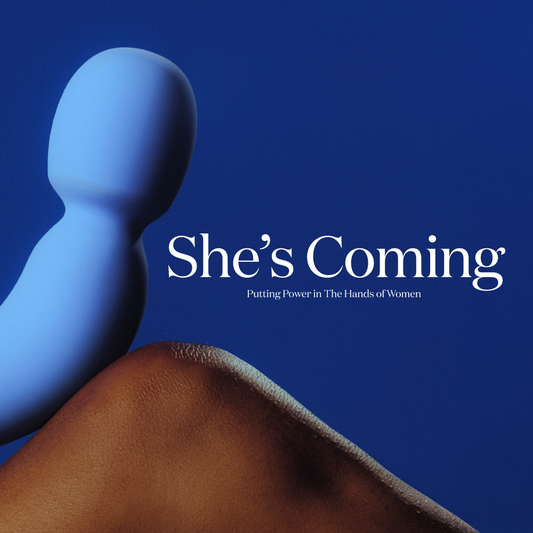If you peruse any women’s magazine or wellness site, you’ll likely come across an article advocating for masturbation as a healthy practice or even a self-care ritual. “Solo play is legit good for you,” claims Women’s Health. “Getting sexy with yourself is actually good for you,” echoes Cosmo. And at Dame, we tout the benefits of masturbation all the time. Until recently, though, popular views of self-pleasure were the opposite. Masturbation has historically been considered sinful, unhealthy, detrimental to partnered sex, or at the very least, indulgent. The current move to normalize and advocate masturbation, especially female masturbation, is a reaction against the prevailing views of the past few centuries.
Views on Masturbation Throughout History
For millennia, masturbation was portrayed and celebrated in art. From prehistoric rock painting to Maltese clay figures and Chinese scroll paintings, from the Kama Sutra to Greek comedy, self-love was depicted non-judgmentally and often. And the time of ancient civilizations was the last historical period when masturbation enjoyed widespread acceptance. Greek philosopher Diogenes the Cynic was known for masturbating in public, claiming, “If only it were as easy to banish hunger by rubbing my belly.” A statue of a woman masturbating was found in ancient Malta, and ancient Egyptian pharaohs masturbated into the Nile as part of a spiritual ritual. Soon after this time, however, Christianity stigmatized any form of sex that wasn’t reproductive, says Hallie Liberman, author of Buzz: The Stimulating History of the Sex Toy. “Masturbation has been considered a sin since the 4th century, not just because it was non-procreative, but also because it occurred outside of marriage,” she explains. Those who preached against self-stimulation – and indeed, against nearly sexual thoughts and all forms of sexual pleasure, including lustful thoughts – found ample source material in the Bible to back their campaign against normal sexual behavior.
- Thessalonians: “It is God’s will…that you should avoid sexual immorality.”
- Galatians 5: “The fruit of the spirit is… self-control.”
- Corinthians: “Your body is a temple of the Holy Spirit…honor God with your body.”
- Matthew 5: (quoting Jesus) “If your right-hand causes you to sin, cut it off and throw it away.”
- Colossians: “Put to death whatever is earthly in you: sexual immorality, impurity, passion…”
- Ephesians 5: “…sexual immorality and all impurity and covetousness must not even be named among you…everyone who is sexually immoral or impure…has no inheritance in the kingdom of Christ and God…”
- Hebrews: “Let marriage be held in honor among all, and let the marriage bed be undefiled, for God will judge the sexually immoral…”
And of course, there’s the granddaddy of all:
- Genesis: “…whenever he
slept with his brother’s wife, he spilled his semen on the ground…and the thing which he did was evil in the sight of the Lord, and He slew him.”
Masturbation was widely considered a risk factor for ailments ranging from blindness to constipation to hairy palms.
That last Bible quote is particularly problematic. According to the text, God had ordered Onan to sleep with his brother’s wife, after God had killed the brother. Onan “spilled his seed” because impregnating his sister-in-law would have endangered his inheritance, and God killed Onan for disobeying him – not for the supposed “act of masturbating” which is never mentioned in scripture. Even so, all of these citations (often citing God’s grace) were used for centuries to condemn not only self-pleasure, but any sexual act other than sexual intercourse within a marriage. Even completely normal nocturnal emissions (wet dreams) were said to make a man unclean, and he remained “unclean” for 24 hours, even after he had bathed. Sexual desire and sexual fantasy? Forget about them, too; they’re sins. (Many religions, including the Roman Catholic Church, and modern-day evangelists like self-styled bible studies theologian John Piper, still cite the same scripture today – even though the vast majority of their followers regularly practice masturbation and other “prohibited” sexual activity. Notably, the passages they quote actually deal with subjects like “sinning” and “sexual sin,” “lust,” and “self control,” rather than masturbation.) In the 18th century, the stigma reached its peak, thanks to the widely-circulated English pamphlet Onania; Or, the Heinous Sin of Self-Pollution. The book’s anonymous author argued that masturbation was addictive and could damage the nerves and muscles. The pamphlet and similar books that followed, some by famed philosophers, were largely designed to support societal norms condemning masturbation – which were based on the long-standing religious beliefs we’ve discussed. Around this time, doctors also got into the act. They began warning men that they had a limited number of sperm and needed to conserve them, says Lieberman. In women, many physicians viewed masturbation as a cause or symptom of nymphomania. By the following century, masturbation was widely considered a risk factor for ailments ranging from blindness to constipation to hairy palms. Female genital mutilation (also known as female circumcision) was even sometimes practiced in the 19th-century U.S. as a way to stop girls from masturbating. “The idea was to redirect women’s sexuality to the only culturally acceptable avenue: vaginal intercourse within marriage,” says Lieberman. The U.S. is one of many places in the world where this process still happens.
Seismic Change in Public Views on Masturbation
Attitudes shifted in the mid-20th century when sexologist Alfred Kinsey began publishing his research findings, including statistics that 90 percent of men and 62 percent of women masturbated, says Lieberman. But the movement to normalize female masturbation really took off in the ‘60s and ‘70s, which marked the advent of sex educator Betty Dodson’s masturbation workshops, the female sexuality pamphlet Our Bodies, Ourselves, and feminist sex toy shops.
Masturbation was promoted as a safer alternative to sex during the HIV/AIDS epidemic in the ‘80s.
“Women were being encouraged to learn about their own body and take control of their sexuality and orgasms, and they were being told that masturbation was an essential step in doing this,” says Lynn Comella, Associate Professor of Gender and Sexuality Studies at the University of Nevada-Las Vegas and author of Vibrator Nation: How Feminist Sex-Toy Stores Changed the Business of Pleasure. By 1972, the American Medical Association had deemed masturbation “neither physically nor mentally harmful” to the human body. A few decades later, in 1994, Surgeon General Joycelyn Elders suggested that masturbation be covered in sex ed curricula. This statement got her fired but left a lasting legacy, including the sex shop Good Vibrations’ enduring designation of May as National Masturbation Month, says Comella. While male masturbation never enjoyed the same empowerment movement as female masturbation, it was promoted as a safer alternative to sex during the HIV/AIDS epidemic in the ‘80s, says Lieberman. And in 2020, we saw a somewhat similar effort to prevent the spread of the coronavirus. Pornhub, for instance, made its premium subscription service free to encourage viewers to stay home. New York City’s guidelines on sex and COVID-19 contained a nugget that was much celebrated across the internet: “You are your safest sex partner.” Even before that, though, many companies employed the view of masturbation as self-care as a marketing strategy, Comella points out. Over the past few years, sex toy brands have been advertising their products as health aids, using words like “essential” to describe them and selling them on drugstore shelves. “There’s a mix of companies promoting masturbation as self-care to sell more stuff and promote their brands, companies promoting masturbation for the health of the nation, and sex educators promoting it as a way of staying sane,” says Lieberman. “Then there’s just horny people trying to normalize masturbation by folding it into our larger obsession with self-care, like the ‘hydrate, meditate, masturbate’ meme.”
While self-pleasure is often accepted as a simple physical urge for men, women have historically been assumed to masturbate for a reason.
While this emphasis on the benefits of masturbation may help reduce guilt and shame, it also can be problematic in some ways. Masturbation can be a source of wellness and self-discovery, but the idea that it should be may “put pressure on women that their masturbation session should look like a perfectly laid out Instagram post, all millennial pink and Hello Kitty vibrators,” says Lieberman. “You shouldn’t need to be chanting a mantra and sipping kombucha while you’re getting off for it to be seen as non-stigmatized. It’s fine for women to masturbate just because they’re horny, and not as part of some larger spiritual or wellness routine. If you want to just lie on your bed in a ratty T-shirt with unbrushed teeth and a greasy face, brandishing a vibrator while watching game-show porn on your cell phone, that’s just as valid.” There also remains a gendered double standard in views of masturbation. While self-pleasure is often accepted as a simple physical urge for men, women have historically been assumed to masturbate for a reason other than sexual stimulation and self-gratification. In 1970s ads for sex toys like Prelude and Vagitone, the reason given for the products was to become better partners for men, says Lieberman. While self-care is perhaps a healthier motivation, those promoting it often overlook the fact that women have sexual urges, too, and don’t always need another justification to masturbate. Another possibly problematic reason the masturbation-as-self-care credo has taken off more among women is that self-care tends to be considered “feminine,” Lieberman explains. Since self-care is already associated with baths and beauty products, the promotion of male masturbation as self-care might even create more stigma around it. As of now, the stereotype remains that male masturbation is quick and dirty while female masturbation is “daintier,” says Lieberman. “I think it would be great to see men’s masturbation promoted by the movement as well, and just for the movement to make the larger point that masturbation doesn’t have to be justified by any sort of health claims for it to be OK,” she says. “You can just be horny and bored. Women get horny and bored, too. Some people learn to bake sourdough during quarantine. Other people learn how to give themselves multiple orgasms. It’s all valid.”





















































